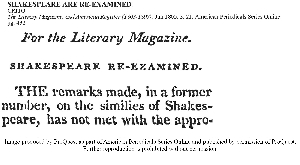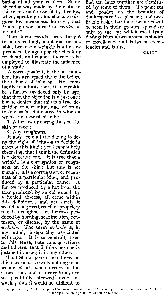 ―432― ―432―
For the Literary Magazine.
shakespeare re-examined.
THE remarks made, in a former
number, on the similies of Shakes-
peare, has not met with the appro-
 ―433― ―433―
bation of all your readers. Some
objection was made by the critic to
the terms made use of by Troilus,
when, speaking of his efforts to dis-
guise his uneasiness, he says, that
“his sigh was buried in wrinkle of
a smile.”
The term wrinkle was thought
to be exceedingly inapt and unsuit-
able, because a wrinkle is a furrow
produced by age upon the cheek or
forehead, and cannot, therefore, be
employed to illustrate the influence
of a smile.
A correspondent, in the last num-
ber, has arraigned the critic before
the tribunal of Johnson. He seems
tacitly to admit, that, if a wrinkle
be a furrow produced only by age,
that then the objection is a just one:
but he denies that this is a true de-
finition of a wrinkle, and refers us
to Johnson's Dictionary, in which a
wrinkle is described to be
1. A furrow or corrugation on the
skin or face;
2. Any roughness.
It may seem a little daring to de-
ny the right of Johnson to decide in
cases of this kind; yet I cannot help
observing, that I think the definition
is a defective one. It is true that a
wrinkle is a corrugation or rough-
ness on the skin: but this is not
enough; it is a corrugation or rough-
ness of a particular kind, and pro-
duced by a particular cause. A
furrow produced by a hot iron, the
scar produced by an old wound, by
a healed abscess, all come within
this definition; and yet surely it
would be a gross breach of propriety
to call a roughness or furrow, pro-
duced by burning, scarification, con-
tusion, or disease, by the name of
wrinkle. The term wrinkle is, in
my mind, inseparably associated
with age. It is so generally used
in this sense, both among writers
and talkers, that I think no one is
justified in using it in any other.
That Shakespeare should err, on
this occasions, is surely nothing to be
wondered at, since errors of the
same kind, and of every kind, are
so plentifully strewed over his
works, that it would be difficult to
find ten lines together not blemish-
ed by some of them. To point out
and ponder on the beauties of
Shakespeare is a pleasing and pro-
fitable task; but these beauties will
be seen in their greatest splendour
only by the eye which most truly
distinguishes between various shades
of excellence, and between excel-
lencies and faults.
crito.
|